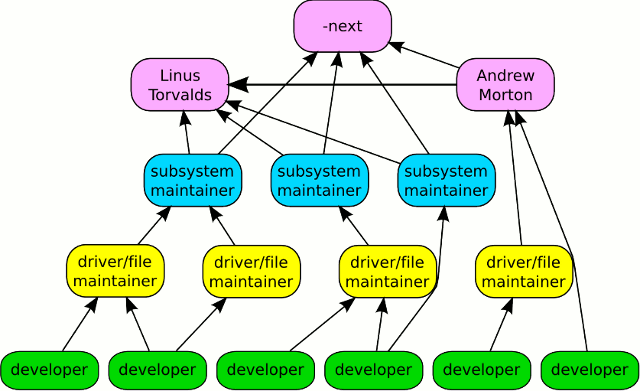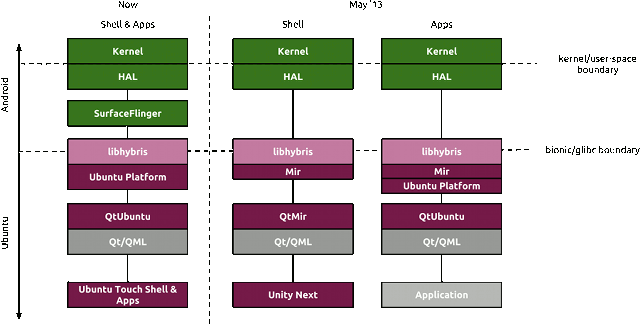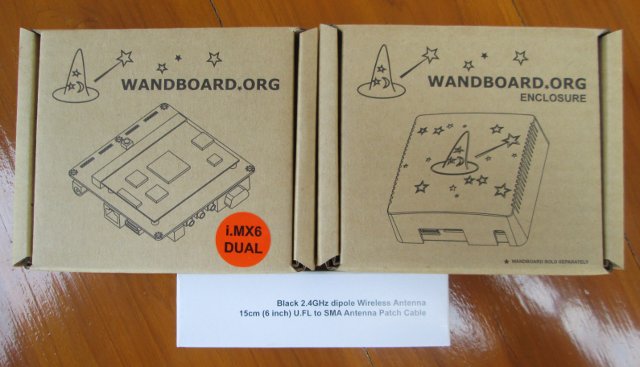If you are a developer interested in getting your code into mainline, Greg KH keynote at Linaro Connect 2013 Hong Kong is probably worth a watch. In this presentation entitled “I Don’t Want Your Code! Linux Kernel Maintainers, why are they so grumpy?”, he first describes the large amount of patches they receive (7.28 patches per hour for kernel 3.8.0), gives some statistic about developers and companies involved with the kernel (about 20% is done by individuals), tells the audience they should submit the kernel code during SoC emulation/simulation stage, so that it’s accepted and ready to use when customers get the silicons (like Intel does), and quotes Intel and IBM executives saying “Working upstream saves time and money”. He then moves on what he does not want to see (and gets a lot): patch series with missing patches, email signature saying it’s confidential (since Linux development is done publicly, […]
Future Versions of Ubuntu To Feature Mir Display Server Compatible With Android Graphics Drivers
The X server is getting old, and many developers complain it’s not an optimal solution anymore due to its (over) complexity, which was why Wayland was developed. However, it turns out Ubuntu will not use Wayland, but instead their own display server called Mir which will be used in all form factors from phones to desktops. Phoronix has provided a quick summary about the key aspects of Mir: Mir is a new display server being developed at Canonical and it is not based on X.Org or Wayland. Android graphics drivers will be supported. Existing DRM/KMS/Mesa/GBM (the open-source Linux graphics drivers) will work. Canonical is pressuring the binary blob vendors to make their drivers compatible. There will be support for legacy X11 applications through an integrated root-less X.Org Server. Canonical will natively support GTK3 and Qt/QML toolkits with Mir. Mir will be used for all form factors from Ubuntu Phones to […]
Linaro 13.02 Release with Linux Kernel 3.8 and Android 4.2.2
Linaro 13.02 is now available, and features Linux Kernel 3.8 and Android 4.2.2. The biggest news this month is probably the first release of a preliminary ARM64 Debian/Ubuntu Raring image. Other noticeable items include work on ARMv7 KVM, more improvements to OpenEmbedded ARMv8 implementation, as well as big.LITTLE MP implementation, and some modifications to the toolchain for Cortex A7 support. Origen images are not available for download this month, and there’s still no ALIP images since they have disappeared since Linaro upgraded to Ubuntu Quantal. Here are the highlights of this release: Android AOSP master build for Galaxy Nexus has been setup All the platforms have been updated to 4.2.2 Support for lava-test-shell has been added to linaro-android-build-tools. Developer Platform CI bring up: ARMv7 KVM – Add Arndale hypervisor patch to u-boot-linaro. CI bring up: Arndale – Add Arndale image reports to LAVA, Enable and verify UEFI support in the […]
Wandboard Dual Unboxing and Quick Start Guide
I’ve just received Wanboard Dual development board together with an enclosure, and Wi-Fi antenna. This board is powered by Freescale i.MX6 Duallite Cortex A9 processor, and comes with 1GB RAM, HDMI output and Ethernet. There’s also a version based on Freescale i.MX6 Solo with 512 MB RAM. You can refer to my earlier post for more detailed specifications. I’ll start by showing some unboxing pictures of the board, and write a quick start guide (casing assembly, Ubuntu & Android boot, and development). I also planned to run some benchmarks and test videos, as according to a poll on Wandboard website many people want to use it as a media player, but I’ll do that a bit later since the current Android image is not up to the task yet. Wandboard Dual Unboxing The package I received contained 3 boxes: one for Wandboard Dual board, one for the enclosure, and one for […]
Linux 3.8 Release
Linus Torvalds has announced the release of Linux Kernel 3.8: The release got delayed a couple of days because I was waiting for confirmation of a small patch, but hey, we could also say that it was all intentional, and that this is the special “Presidents’ Day Release”. It sounds more planned that way, no? Anyway, the really good news is that things calmed down a lot on the last week. There are noticeably fewer commits, and they are also all quite small. The few commits with more than just a couple of lines tend to be due to a couple of reverts, and two architecture patches where some identifiers got renamed (tile), or some defines got moved from the uapi file to a private header (x86). And there’s one radeon patch that uses a helper function instead of reading bytes directly. And even those “bigger” patches weren’t really that […]
Developer Community for Freescale i.MX6 HDMI Dongles
Last week, I explained how to build U-boot, the kernel, and Android for Freescale i.MX6 HDMI dongle reference platform. Since them, there has been a bit more activity, with Richtechie releasing source code to some ARMTvTech members. However, this source code is very similar to the one released by Freescale, and misses some part present in the kernel config on GK802 such as CONFIG_MACH_MX6Q_RICHTECHIE, and the company clearly does not comply with the GPL. Let’s forget that for now, as Jasbir (who is also behind the Hackberry board) has managed to build and boot the kernel on his mini PC. There’s still more work to do, but at least we have a based to work on. In the meantime, I’ve noticed rz2k, an other developer, was also giving it a try on #arm-netbook Freenode IRC channel, so we decided to setup a few things to facilitate development and communication between developers. […]
Linaro Connect Asia 2013 Sessions and Mini-Summits
Linaro Connect Asia 2013 (LCA13) will take place in Hong Kong again this year, on March 4 – 8, 2013 at the Gold Coast Hotel. Linaro recently published the event schedule, with sessions focused on kernel, power management, toolchain, graphics and multimedia, platform, validation, and QA tracks, as well as 2 mini-summits: Linaro Enterprise Group (LEG) which will discuss about ARM server, and an as-yet-unannounced group (Linaro Networking Group?) within Linaro. There will also be hacking sessions each day (except on “Demo Friday”) where you can certainly expect to learn many useful skills/tips. I’ve selected 2 sessions or keynotes per day that I think could be especially interesting. Some of the sessions don’t have description yet, so even if they might seem interesting I’ve usually skipped those. Monday 12:00 – 13:00 – Low Level Virtual Machine (LLVM) Update The Toolchain Working Group started working on LLVM in January 2013. Come […]
linaro-android-tools Scripts Upgrade Android Kernel & Initrd via ADB
With Linaro 13.01 release, Linaro announced linaro-android-tools (aka Kernel Update Tools), a set of tools to improve development time for kernel developers. Today, they published a blog post explaining those scripts allow developers to update the kernel without having to take out the SD card from their development board, and instead update the firmware via ADB with a PC connected via the network or USB. Currently there are 2 shell scripts: update-android.sh – To update kernel files in boot partition such as boot.tar.bz2, single files (e.g. uImage) or kernel modules. Usage:
|
1 2 3 4 5 6 |
update-android.sh [--serial|-s serial] [--partition|-p boot-partition] <boot.tar.bz2|uImage|board.dtb|...> Update the kernel files in the boot partition of the specified android device with the specified boot.tar.bz2 file update-android.sh [--serial|-s serial] kernel-source-directory Push all the module files in the specified kernel directory into the /system/modules directory of the specified android device |
For example:
|
1 |
./update-android.sh out/target/product/pandaboard/boot.tar.bz2 |
update-uInitrd.sh – To update files in the initrd Usage:
|
1 2 3 4 5 |
update-uInitrd.sh [--serial|-s <serial>] [--partition|-p <boot-partition>] [--target|-t <target-file>] <source-file> Update the target file in uInitrd of the specified device with the specified source file When the target file is not specified, will update the file in the root directory that has the same file name of the source file |
For example:
|
1 |
./update-uInitrd.sh /tmp/init.rc |
Those 2 scripts are available in Linaro git repository:
|
1 |
git clone http://android.git.linaro.org/git-ro/platform/external/linaro-android-tools.git |
Currently the scripts only support Pandaboard, Origen, Versatile Express, and Versatile Express A9 boards,but they could be easily modified to support other boards supporting linaro packages. Jean-Luc Aufranc (CNXSoft)Jean-Luc started CNX Software […]







